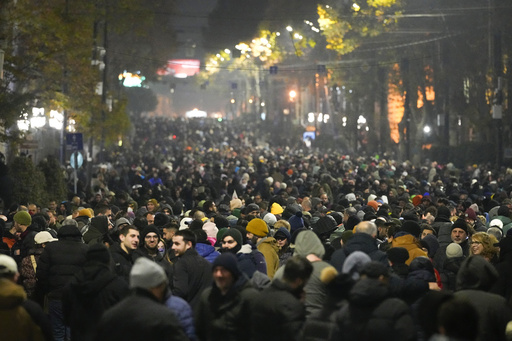Tbilisi, Georgia — Protests in Georgia extended into their 11th consecutive day as tens of thousands gathered on Sunday, prompted by the ruling party’s decision to halt discussions regarding the country’s accession to the European Union. Simultaneously, a different protest criticized the violence faced by Georgian journalists covering these ongoing demonstrations.
Law enforcement has increasingly intensified their measures to control the protests, primarily focused around the parliament building in Tbilisi. Riot police have deployed water cannons and tear gas regularly to disperse crowds, resulting in numerous clashes where protesters retaliated by throwing fireworks and erecting barricades on the capital’s main avenue.
During the demonstration on Saturday night, journalist Maka Chikhladze reported that she and a colleague from the independent Pirveli TV were assaulted by a violent group. Chikhladze recounted that her colleague managed to film men dressed in black attacking protesters before they shifted their aggression towards the journalists, ultimately leading to Chikhladze being shoved to the ground. She later indicated that her colleague suffered a head injury and had his camera stolen in the altercation.
Chikhladze accused the Georgian administration of encouraging gangs to intimidate individuals from participating in anti-government protests, a claim that representatives of the Georgian Dream party have refuted. In response to the violence against media workers, several hundred journalists marched along Tbilisi’s Rustaveli Avenue, displaying posters of fellow journalists they claim have been assaulted while performing their duties.
TV Pirveli anchor Ekaterine Mishveladze addressed the ongoing safety concerns, stating, “Our colleagues are beaten, injured, some remain in hospital in serious condition.” In another incident on Saturday, several masked individuals were observed violently confronting a protester trying to enter the offices of the opposition party, Ahali. The protester, Koba Khabazi, was left on the ground as his attackers continued to kick him, later revealing his head injuries to journalists.
Following the contentious parliamentary election on October 26, which was regarded as a referendum on Georgia’s EU ambitions, the Georgian Dream party maintained its parliamentary control. The opposition parties, alongside the pro-Western president Salome Zourabichvili, have accused the ruling party of manipulating the election results with assistance from neighboring Russia and have since boycotted parliamentary proceedings.
The decision by the Georgian Dream to suspend talks on EU accession last Thursday provided renewed vigor for the opposition’s protests. Riot police escalated their tactics—utilizing water cannons and tear gas against demonstrators, while protesters continued to retaliate with fireworks and barricades.
This crackdown has sparked severe backlash from both the United States and European Union officials. U.S. Secretary of State Antony Blinken condemned what he termed the brutal repression against those campaigning for closer ties with Europe during a recent ministerial conference.
In a press briefing on Sunday, Mamuka Mdinanradze, the leader of the Georgian Dream party, denounced the violent behavior against protesters and claimed no affiliation with the assailants. Additionally, Georgia’s rights ombudsman criticized the police for their inadequate response to ensure safety amid the protests.
President Zourabichvili, whose position is largely ceremonial, has refused to acknowledge the official election outcome and has challenged it before the Constitutional Court, a plea that was dismissed earlier this week.
In December 2023, the EU conferred candidate status to Georgia, contingent on the nation fulfilling specific criteria. However, in June, the bloc paused accession talks and reduced financial aid due to a controversial “foreign influence” law, perceived as detrimental to democratic freedoms. This legislation mandates that organizations receiving over 20% of their funding from abroad register as acting on behalf of foreign interests, reminiscent of a similar Russian law targeting dissenting organizations.


